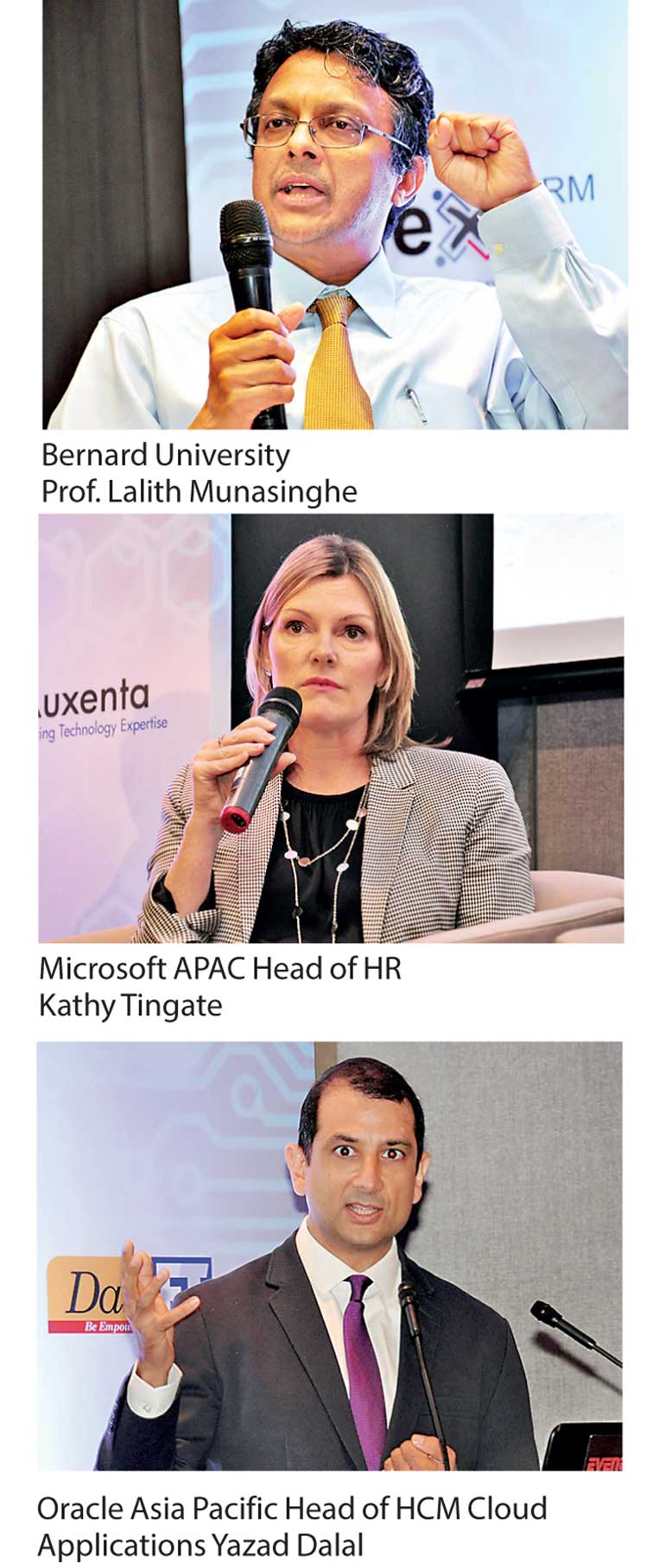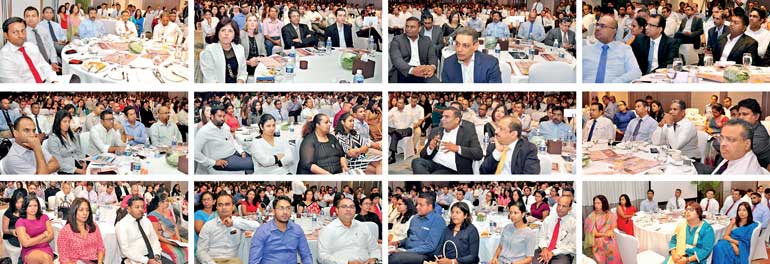Tuesday Feb 17, 2026
Tuesday Feb 17, 2026
Wednesday, 14 March 2018 00:00 - - {{hitsCtrl.values.hits}}


By Charumini de Silva
The SLASSCOM People’s Summit 2018 successfully concluded recently sharing key insights to challenges and prospects for the professional community.
Delivering the keynote address during the three breakout sessions, Virtusa Executive Vice President and Chief Operating Officer Keith Modder highlighted that industry competitiveness is a revolution.
He emphasised even if a company that starts late and if technology is available, they could leap frog and catch up with the rest, insisting that this is what the brink of the fourth industrial revolution looks like.
Outlining the fourth industrial revolution drivers, he underscored four factors which include technology innovation, disruptive startups, millennial consumers and underutilised assets in supply chain and emphasised what companies need to focus on to stay relevant in the marketplace.
“Create a frictionless platform to interact with consumers, build leaders that are relevant to the workforce of tomorrow and create a culture that enables speed,” he added.
He pointed out that companies such as Uber and Airbnb are really taking advantage of underutilised assets in supply chain.
“The fourth industrial revolution has brought together a compilation of opportunities where technology has taken advantage of monetising underutilised assets. If you don’t do it, someone else is going to do it,” he stated.
Modder predicts that by 2020 around 50% to 60% of the workforce will comprise of millennials in the gig economy.
“It is not about the age you are in, but the age you live in. It is not about demography, but it is about great customer service and convenience, where it enables both customer and employer. There is no excuse about not taking note of these technologies and platforms,” he said.
He emphasised culture, platforms and talent as three major factors in workforce and workplace evolutions in the fourth industrial revolution.
“Culture of companies is changing from hierarchy to wirearchy. Companies master the power of people working through connecting and collaborations. Taking responsibilities collectively and individually rather than relying on traditional hierarchical structure. Platforms are becoming frictionless client and employee experience. They highlight the systems of intelligence in addition to employment and record,” he added.
In terms of talent Modder pointed out that nature of work and workforce are changing. “The source of talent will be virtual – borderless, gig and flex workers. The skill set shift will be more focused on design thinking, AI, work out loud. Social leadership will be used to systematically build and rely on relationship, reputational power to get things done.”
He highlighted the fact that it was important to have platforms in organisations that helps capture new ideas. “The ideas are no longer emanates from the CEOs of the company. Innovation in happening at every single stage of the company,” he stressed.
Noting that Virtusa has built a platform to change the way they work, learn, share and connect, he said V+ platform was designed to engage millennials to drive collaborations, generate insights at the point of need to empower employees.
“Our V+ platform has gamified key business areas to drive engagement and innovation,” he asserted.
Modder said gamification is the process of using game thinking and game mechanics to solve problems and engage users. “Games are a way of life for millennials.”
Stressing on some of the V+ gamification outcomes Modder said it helped Virtusa drive revenue, driving project delivering and driving people excellence.
“These are things that can transform companies today. I think when you consider about the talent pool of tomorrow, it is not hard for the leadership to change mindset. It is a huge opportunity to be part of the revolution,” he pointed out.
Following the keynote, the SLASSCOM People Summit 2018 broke into three breakout sessions, which covered a variety of topics. The participants were given the choice to select a session of their choice. The three sessions included data analytics conducted by University of Columbia Professor of Economics Prof. Lalith Munasinghe, future ready organisations conducted by Oracle Asia Pacific HR Director Rachna Sampayo and building collaborative organisations conducted by Microsoft APAC Director HR Kathy Tingate.
At the future ready organisations session conducted by Oracle Asia Pacific HR Director Rachna Sampayo elaborated that today’s trends have changed the way in which everyone, including HR professionals thinks and do their work with the adaptation of mobility, social, data, cloud apps and devices.
She said the modern learner was impatient, tech-savvy, disrupted and on the go.
Referring to Deloitte Global HR performance scorecard 2015-2017 she stressed that the proportion of respondents rating their HR capabilities as getting by and adequate has marginally increase and that rating their capabilities as good has marginally decreased since 2016.
Highlighting some of the infinite innovation at Oracle she said connected intelligent cloud suites, AL augments human capability, data drives differentiation the human interface mundane tasks automated new CXO roles.
“Our IoT capability designed for business outcomes which are smart, impactful and integrated,” she emphasised.
Sampayo said Oracle’s HR Transformation journey began more than 15 years ago where 70 disparate systems were simplified, consolidated, automated and put into a global single instance (GSI).
“Our journey started more than a decade ago with collaborative, talent-centric, insightful and mobile factors which helped us to enhance organisational effectiveness, talent management and HR analytics,” she added.
According to her the HR transformation big bets include insight that matters to drive innovation and decisions that make a difference, employee experience that supports talent, achieve strategy and help customers succeed as well as integrated technology to keep the information and experience together.
To harness the power of workforce sentiment Sampayo outlined importance of HR analytics, engagement surveys, content management systems, social media and Human Resource ERP.
The breakout sessions were followed by a panel discussion including all three session conductors on transforming the way they think, work and connect.
A case study presented by NASSCOM Director Ashok Pamidi spoke extensively about diversity and inclusion. He said the 1990s was when many global giants re-entered India where, many women also started entering higher education and the IT/BPM industry.
He elaborated on how NASSCOM supported to empower women in the industry.
According to 2015 data he said 34% of women engaged in the ICT sector in India are in the mainstream workforce and are the primary breadwinners of their households.
“The number of women engaged in the sector is growing as a result of more females are being recruited for entry-level employment, while other forms of diversity from generational, LGBT+ and differently-abled persons have been opened as well,” he added.
Pamidi went on to say how NASSCOM works with many research institutes and releases white papers for member companies. He also highlighted that they work in collaboration with Governments and run programs to recognise companies and workshops.
Over the last decade, he said there has been a 1.8x increase in women workers since 2009, where they are currently working on various initiatives across 19 regions to increase this number.
At present, NASSCOM also operates two centres for disabled people in Bangalore and Delhi.
Pamidi also highlighted fact that they are looking at creating a well-oiled machine to help women rise through the ranks.
Deloitte India Partner and Chief Talent Officer S.V. Nathan pointed out that digitisation was the key to success.
“Around 85% of the population of India is millennial and at digital learning there’s a lot happening. The millennials prioritise coaching and development to a point where they’re open to the skills they earn from you,” he added.
“The core elements of millennials approach are check in with managers with meaningful conversation and career coaching. Finally, performance analysing by public evaluations because while you judge others, others judge you,” he added.
Great Place to Work India CEO Prasenjit Bhattacharya spoke on application, obstacles, challenges when implementation.
He said it was important for organisations to understand the business models according to the evolving business environment, while keeping in mind about the outcome of those.
“Leading hotel chain Marriott once stated that they’ll add 30,000 rooms in two years, while Airbnb said it will do it in two weeks. This shows what a change in business models can bring about to in the fourth industrial revolution. While companies keep in mind on being efficient, they must also consider whether it is essential for the final outcome,” he pointed out.
Sharing few examples on how once leading companies failed while waiting without leap forging to the next phase of growth in the sector he pointed that more than 50% of the fortune 500 companies don’t exist anymore as new market disrupters have taken over their place.
“Ptanjali disrupted the life of FMCG sector in India. Fast growing FMCG companies such as Unilever, Nestle and Darbur were all taken back when it entered the market and captured a vast segment of the consumers,” he said.
However, he said these companies had the muscle to make money with their distribution network and they managed to withstand the blow from Patanjali.
While pointing that digital disruption is real, he said that not all die from it.
With the fast evolving technology Bhattacharya said millennials no longer hold on to things for too long. “Their currency is trust and their security comes from network.”
He also said analytics will define how businesses are done. “Google already knows more about customers than your sales team. LinkedIn and Facebook know our employees, but the guys who know analytics may not know your business model. There are many stories of failures in analytics.”
He pointed out that collaboration is the only way to change the mindset of the organisation to welcome analytics insisting that analytics is meaningless unless every part of your organisation is willing to corporate.
Bhattacharya said it was interesting how internet is trying to free us and said there was going to be a new alphabet which includes, A for AI, B for Big data, C for cloud and D for digital.
Thereafter a final panel discussion was held comprising Great Place to Work India CEO Prasenjit Bhattacharya, Oracle Asia Pacific Head HCM Cloud Applications Yazad Dalal, IFC Women in Work Program Manager Carmen Niethammer and Deloitte India Partner and Chief Talent Officer S.V. Nathan on implementation and challenges.
Pix by Lasantha Kumara